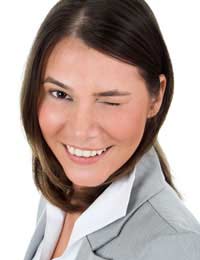Twitches

Twitches also known as nervous tics are involuntary movements that usually occur in a person’s face arms or shoulders. The twitches usually do not last very long. They seem to serve no useful or actual purpose. Nervous twitches can be repetitive in nature, such as continuous eye blinking. Typical twitches would involve the corners of the mouth, the corner of an eye or eyes, the entire head, arms or shoulders.
Causes of Twitching
Often twitches can be caused by some kind of damage to the nervous system, either congenital or from trauma or disease. However other twitches can be caused by underlying physical or even psychological conditions, such as Tourettes syndrome. In a person with Tourettes syndrome uncontrollable tics or twitches are often seen, which are worsened when the person suffering from Tourettes is under stress. Similarly, repetitive motions such as tics and twitches of the hands and face can accompany other conditions such as Autism and Asperger’s Syndrome. There are twitches that can be caused by unknown psychological or emotional problems, and then there are the twitches that have simple physiological causes such as too much caffeine or a reaction to certain medications.Most nervous tics are in no way life threatening or indicative of serious illness, however if the twitches are interfering with your ability to lead an active and happy life, than a plan of treatment should be sought from a medical professional. There are certain disease states that have twitches as a symptom such as Parkinson’s Disease or Huntington's chorea, but these condition have much more obvious symptoms than twitching, and would likely be suspected for reasons other than mere twitching. Heavy metal poisoning such as from lead or mercury exposure can cause nerve damage and result in twitching. A person exhibiting twitching with no other apparent physical or psychological cause will likely be tested for heavy metal poisoning.
Twitches Vary
A twitch is an involuntary muscle movement caused by the firings of an overwrought nervous system. The person experiencing it can always feel a twitch. A person with the twitch will feel the twitching or jittering sensation, but the twitch itself may be so slight as to be imperceptible to others. This often happens in the case of eye twitches from simple eyestrain or too much caffeine. Many people experience twitches of several different muscles after vigorous exercise, or just prior to falling asleep.Treatments for Twitches
Of course the treatment for twitches depends on diagnosing their cause. If an underlying physical reason for the twitches can be found, and that cause is treatable, the twitches will so vanish with the apropos treatment. Twitches that are the result of stress, strain or fatigue can be made to disappear on their own with a few lifestyle changes.Medications and behavior modification can be helpful in lessening the twitches and tics that come with Tourettes or Asperger’s.For tics and twitches that can not be directly linked to any physical or neurological cause, stress and diet can often be the culprit. Several dietary changes and nutritional supplements have been suggested that can help control tics and twitches. These include:
- Reduce the intake of caffeinated and alcoholic beverages
- Reduce intake of refined sugars
- Supplementation of Calcium and Potassium
- Drinking of Quinine Water
- Increased intake of B-vitamins
- Chamomile tea Valerian root and other herbs that are known to have a calming effect on the nervous system
- Acupuncture
- Chi-gong
- Tai-chi
- Yoga
- Massage Therapy
- Chiropractic
- Rolfing
- Coping With Receding Gums
- Excessive Earwax and How to Treat it
- Cold Sores and How to Treat Them
- Unsightly Warts on the Face and Neck
- Stained Teeth
- Types of Skin Scars
- Wrinkles & Thread Veins
- Moles
- Coping With Dandruff
- Treating Head Lice
- Facial Hair
- Hair Loss & Thinning
- Bad Breath
- Blushing/Flushing
- Acne/Spots


Re: Talking to an Elderly Person About Hygiene
My mom is 95. I had a talk with her about having someone come in and do light housekeeping, wash her bed sheets…
Re: Adult Bed Wetting
I am 57 and still wet the bed most nights.
Re: Verrucas
I'm 13 in about 6 days I've had verrucas since I was 8-9, it's so embarrassing because I have to get changed in a group for PE I have one on the outside of…
Re: Hairy Toes & Feet
So funny how bigots of both signs say the opposite, that the shaved man aesthetics is influenced by gays, now some gay people say it's…
Re: Inverted Nipples
Hi im 13 and yesterday i realised i have inverted nipples but i had a surgery near my heart when i was four months old and i just want to not have…
Re: Adult Bed Wetting
i have been a bedwetter for so long now i am used to it and sleep in a single bed next to my wife
Re: Adult Bed Wetting
Hi im 52 the last 6 months ive started to.wet the bed. It can happen 2 or more times a week . I went to bed at 2am i woke up at 5am needing to…
Re: Unsightly Warts on the Face and Neck
Ihello I have face warts many years and Neck ,pls help
Re: Adult Bed Wetting
i was a bedwetter as a child until 15 due to molestation a few times growing up.. then went in hospital age 18 and wet the bed whilst staying…
Re: Inverted Nipples
Blb - Your Question:Hi I’ve recently had my baby and ever since Then I have one inverted nipple not breastfed should I be concerned?